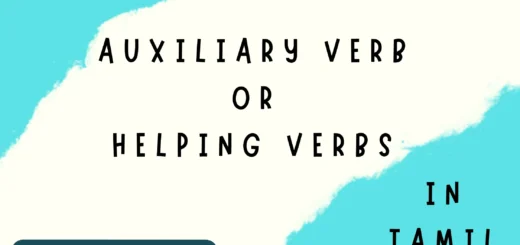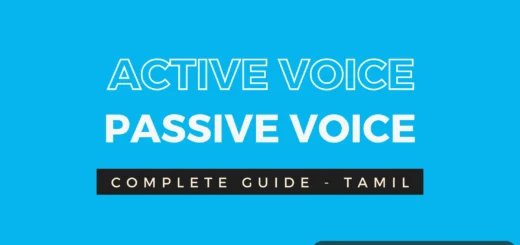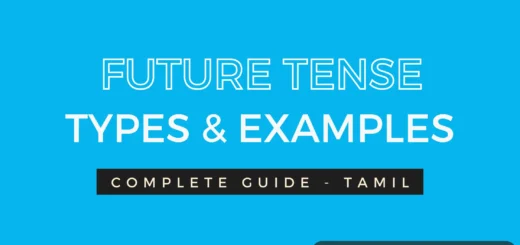4 types of present tense in Tamil with examples
Learn present tense in Tamil. இந்த பதிவில் ஒவ்வொரு வகை present tense ஐப் பற்றி தெளிவான விளக்கங்கள், எடுத்துக்காட்டுகள், எப்படி உபயோகித்து வாக்கியங்களை உருவாக்க வேண்டும், ஒவ்வொரு tenseஐயும் எப்படி வினா வாக்கியமாக, எதிர்மறை வாக்கியமாக மாற்றுவது போன்றவற்றை எளிமையாக காண்போம்.
The Simple Present Tense in Tamil
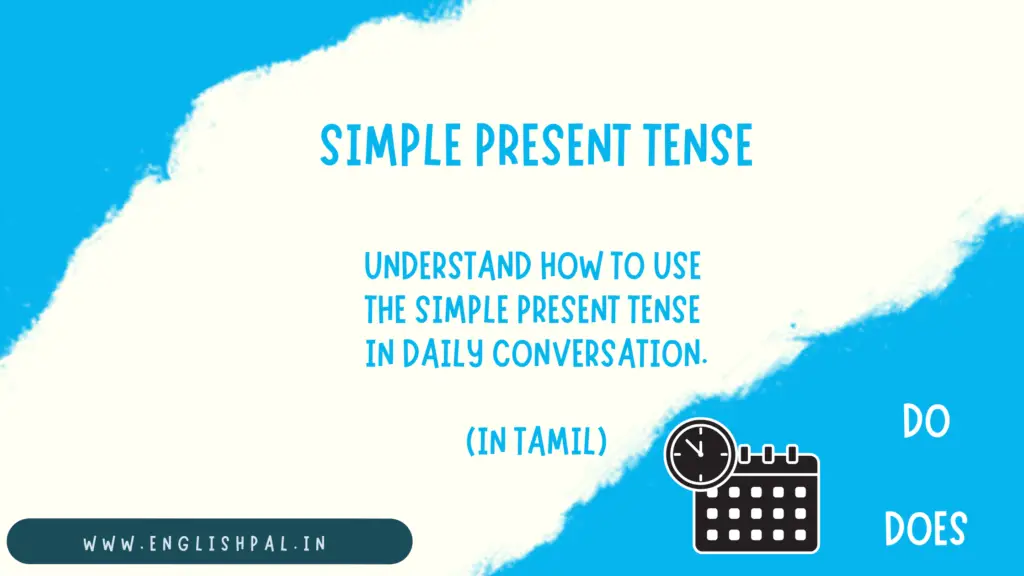
The simple present tense is used to describe the following things.
- Habits (பழக்கங்கள்).
- Repeated events or actions (மீண்டும் மீண்டும் நடக்கும் நிகழ்ச்சிகள்).
- General truth (பொதுவான உலகம் ஏற்றுக்கொண்ட உண்மைகள்).
- Instructions (வழிமுறைகள்).
- Fixed(pre-planned) arrangements (முன்னதாகவே திட்டமிடப்பட்ட நிகழ்வுகள்).
இங்கு நாம் அடிப்படை வினைச்சொல்லையே உபயோகிக்கின்றோம்.
1. Habits (பழக்கங்கள்)
தினமும் நடக்கும் நிகழ்வுகளை அல்லது நாம் செய்யும் செயல்களை குறிப்பிடும்போது நாம் simple present tense ஐ உபயோகிப்போம்.
Examples of habits
- I eat breakfast at 8 a.m. – நான் காலை 8 மணிக்கு காலை உணவு சாப்பிடுகிறேன்.
- He drinks black tea only. – அவர் கருப்பு தேநீர் மட்டுமே குடிப்பார்.
2. Repeated events or actions (மீண்டும் மீண்டும் நடக்கும் நிகழ்ச்சிகள்).
ஒரு செயலானது மீண்டும் மீண்டும் நடப்பதை குறிப்பிடும்போது நாம் simple present tense ஐ உபயோகிப்போம்.
Examples of repeated events
- I always go to work by car. – நான் எப்பொழுதும் வேலைக்கு காரில் செல்லுவேன்.
- Teachers give homework to their students. – ஆசிரியர்கள் தங்கள் மாணவர்களுக்கு வீட்டுப்பாடம் தருவார்கள்.
- He wants regular updates on the report. – அறிக்கையின் தற்போதைய நிலை பற்றி அவர் தெரிய விரும்புகிறார்.
3. General truth (பொதுவான உலகம் ஏற்றுக்கொண்ட உண்மைகள்).
உலக உண்மைகள் அல்லது அனைவராலும் பொதுவாக ஏற்றுக்கொள்ளக்கூடிய உண்மைகளை குறிப்பிடும்போது நாம் simple present tense ஐ உபயோகிப்போம்.
Examples of general truths
- The earth goes around the sun. – பூமியானது சூரியனை சுற்றி வருகிறது.
- The sun rises in the morning. – சூரியன் காலையில் உதிக்கும்.
- Water evaporates at 100 degrees Celsius – தண்ணீர் 100 டிகிரி செல்சிஸ் வெப்பநிலையில் ஆவியாகும்.
4. Instructions (வழிமுறைகள்).
நாம் instructions வழங்கும்போது, ஒரு செயலை எவ்வாறு செய்வது என்பதை பற்றி கூறும்போது simple present tense ஐ உபயோகிப்போம்.
Examples for instructions
- Open the document and change the data. – அந்த கோப்பை திறந்து தகவலை மாற்றுக.
- Go to the class room and tell Rajan to meet me at 3 p.m. – வகுப்பறைக்கு சென்று ராஜனிடம் மதியம் மூன்று மணிக்கு என்னை சந்திக்க சொல்.
- See the tutorial videos and try to do it accordingly. – அந்த செய்முறை காணொளியை பார்த்து அது போல செய்யவும்.
5. Fixed or pre-planned arrangements (முன்னதாகவே திட்டமிடப்பட்ட நிகழ்வுகள்).
முன்னதாகவே திட்டமிட்ட செயல்கள் அல்லது நிகழ்வுகளை கூறும்போது நாம் simple present tense ஐ உபயோகிப்போம்.
Examples for pre planned arrangements
- We plan to start work on Monday. – திங்கள்கிழமை வேலையை துவங்க திட்டமிட்டுள்ளோம்.
- Our holiday starts tomorrow. – எங்கள் விடுமுறை நாளை தொடங்குகிறது.
- The train leaves in 5 minutes. – ஐந்து நிமிடத்தில் ரயில் கிளம்பும்.
- He will meet you before he moves. – அவர் கிளம்புவதற்கு முன் உங்களை சந்திப்பார்.
- I will call you once I get there. – நான் அங்கு சென்றதும் உனக்கு கால் செய்கிறேன்.
- He will let us know once he gets the information. – அவருக்கு தகவல் தெரிந்ததும் நமக்கு சொல்வார்.
Simple present tense வாக்கியத்தில் காணப்படும் வார்த்தைகள்
கீழ்க்கண்ட வார்த்தைகளை simple present tense இல் பொதுவாக காணலாம். இதனைக்கொண்டு நாம் என்ன tense என்பதை அறியலாம்.
- Every day = தினமும்.
- Sometimes = சில சமயம்.
- Always = எப்பொழுதும்.
- Often = அடிக்கடி
- Usually = வழக்கமாக
- Seldom = எப்போதாவது
- Never = ஒருபோதும் இல்லை
- First ….. Then = முதலில் ….. பிறகு.
The Simple Present Tense Formula & Examples in Tamil
Subject + do / does + verb.
| Subject | do / does | verb |
| I / we / You / They | do | verb |
| He / She / It / Name | does | verb |
I, we, you, they வரும் இடங்களில் do வரும்.
He, she, it, name வரும் இடங்களில் does வரும்.
Example
I do try or I try both are the same. – நான் முயற்சி செய்கிறேன்.
| Noun | Singular | Plural |
| First person noun | I see or I do see. | We see or we do see |
| Second person noun | you see or you do see. | you see or you do see. |
| Third person noun | He Sees or He does See She Sees or She does See It Sees or It does See Ravi Sees or Ravi does See. | they see or they do see. |
The Simple Present Tense Negative Formula & Examples in Tamil
Subject + do / does + not + verb.
| Subject | do not / does not | verb |
| I / we / You / They | do not | verb |
| He / She / It / Name | does not | verb |
நாம் “do not” என்பதை “don’t” எனவும், “does not” என்பதை “doesn’t.” எனவும் எழுதலாம். இதனை ஆங்கிலத்தில் contraction என்பர்.
Example
I do not try. – நான் முயற்சி செய்வதில்லை.
| Noun | Singular | Plural |
| First person noun | I do not see or I don’t see. நான் பார்க்கவில்லை. | We do not see or we don’t see. நாங்கள் பார்க்கவில்லை |
| Second person noun | you do not see or you don’t see. நீ / நீங்கள் பார்க்கவில்லை | you do not see or you don’t see. நீ / நீங்கள் பார்க்கவில்லை |
| Third person noun | He does not see or he doesn’t see. அவன் பார்ப்பதில்லை. She does not see or she doesn’t see. அவள் பார்ப்பதில்லை. It does not see or it doesn’t see. அது பார்ப்பதில்லை. Ravi does not see or Ravi doesn’t see. ரவி பார்க்கவில்லை. | they do not see, or they don’t see. அவைகள் / அவர்கள் பார்ப்பதில்லை. |
The Simple Present Tense Interrogative Formula & Examples in Tamil
Do / Does +Subject + verb.
| do / does | Subject | verb |
| do | I / we / You / They | verb |
| does | He / She / It / Name | verb |
Do, does ஆகிய auxiliary verbs ஐ noun க்கு முன்னால் மாற்றி வாக்கியத்தின் கடைசியில் வினாக்குறி இட வேண்டும்.
Examples
Do I try? – நான் முயற்சி செய்யலாமா?
Does he try? – அவன் முயற்சி செய்யலாமா?
| Noun | Singular | Plural |
| First person noun | Do I see? நான் பார்க்கிறேனா? | Do we see? நாங்கள் பார்க்கிறோமா? |
| Second person noun | Do you see? நீ பார்க்கிறாயா? | Do you see? நீ பார்க்கிறாயா? |
| Third person noun | Does he see? அவன் பார்க்கிறானா? Does she see? அவள் பார்க்கிறாளா? Does it see? அது பார்க்கிறதா? Does Ravi see? ரவி பார்க்கிறாரா? | Do they see? அவர்கள் பார்கின்றனரா?/ அவைகள் பார்க்கிறதா? |
Exercises for the simple present tense
கீழே கொடுக்கப்பட்டுள்ள வாக்கியங்களைக்கொண்டு வினாவாக்கியம் மற்றும் எதிர்மறை வாக்கியங்களை அமைத்து பயிற்சி எடுக்கவும்.
- Cow eats grass.
- People eat three times a day.
- Rani enjoys dancing.
- I go to the hospital.
- The new mall opens tomorrow.
- My dad retires next month.
- We plan to leave India next year.
- Children learn fast.
- Many stores close on Sunday.
- The bus departs in fifteen minutes.
The Present Continuous Tense in Tamil
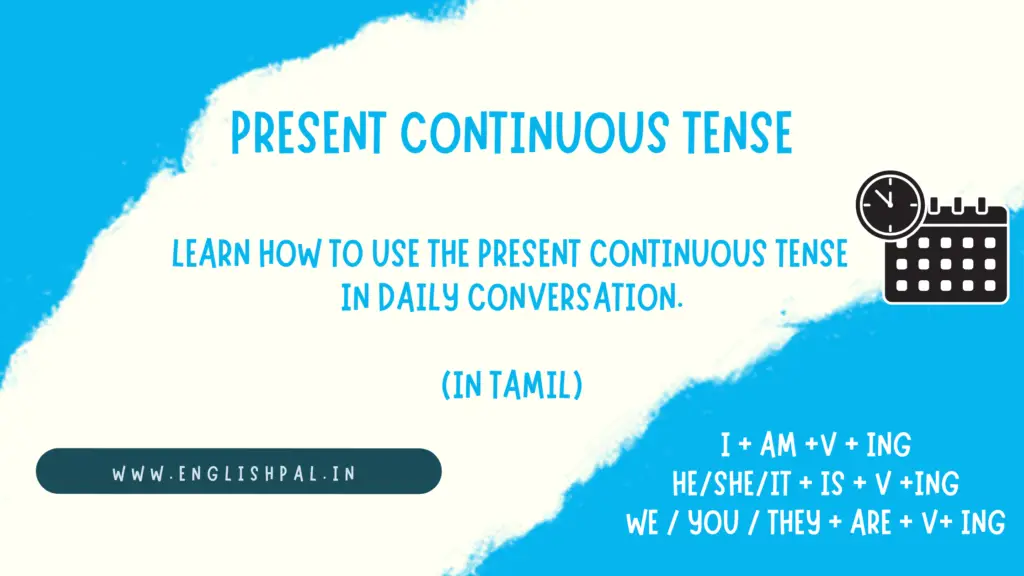
ஒரு செயலானது ஆரம்பித்து தற்போது நிகழ்ந்து கொண்டு இருப்பதை குறிக்க The Present Continuous Tense உதவுகிறது.
இங்கு நாம் am, is, are ஆகிய துணை வினைச்சொற்களை (helping verbs or auxiliary verbs) உபயோகிப்போம்.
வினைச்சொல்லுடன் ing சேர்ந்து வருவதை present participle என அழைப்போம்.
Examples of the the present continuous tense
- I am watching this movie now. – நான் இந்த திரைபடத்தை பார்த்துக்கொண்டு இருக்கிறேன்.
- He is standing at the bus stop. – அவன் பேருந்து நிலையத்தில் காத்துக்கொண்டு இருக்கிறான்.
- She is eating an apple. – அவள் ஒரு ஆப்பிள் பழத்தை சாப்பிட்டுக்கொண்டு இருக்கிறாள்.
Signal words of the the present continuous tense
present continuous tense இல் கீழே கொடுக்கப்பட்டுள்ள வார்த்தைகள் பொதுவாக பயன்படுத்தப்படுகிறது.
- Now – இப்போது.
- At the moment, – தற்போது,
- Look! – பார்!
- Listen! – கேள்!
The Present Continuous Tense Formula
Subject + am / is / are + verb + ing
| Subject | Am / is / are | verb + ing |
| I | am | verb + ing |
| we / You / They | are | verb + ing |
| He / She / It / Name | is | verb + ing |
| Noun | Singular | Plural |
| First person noun | I am | We are |
| Second person noun | you are | you are |
| Third person noun | He is She is It is Ravi is | they are |
Example of The Present Continuous Tense in Tamil:
- I am thinking about what happened yesterday. – நான் நேற்று என்ன நடந்தது என்பதை பற்றி யோசித்துக்கொண்டு உள்ளேன்.
- We are moving to the USA next week. – அடுத்தவாரம் நாங்கள் USA செல்ல உள்ளோம்.
- You are doing a great job! – நீங்கள் ஒரு சிறப்பான வேலையை செய்கிறீர்கள்!
- They are watching the drama. – அவர்கள் அந்த நாடகத்தை பார்த்துக்கொண்டு உள்ளார்கள்.
- He is playing the piano. – அவன் பியானோவை வாசிக்கின்றான்.
- She is sleeping. – அவள் உறங்கிக்கொண்டு இருக்கிறாள்.
- It is working well. – இது நன்றாக வேலைசெய்துகொண்டு இருக்கிறது.
- Haran is doing his job. – கரன் தன் வேலையை செய்கின்றான்.
The Present Continuous Negative Formula & Examples in Tamil
Subject + am not / is not / are not + verb + ing
| Subject | am not / is not / are not | verb + ing |
| I | am not | verb + ing |
| we / You / They | are not | verb + ing |
| He / She / It / Name | is not | verb + ing |
Examples
- I am not thinking about what happened yesterday, or I ain’t thinking about what happened yesterday. – நேற்று நடந்ததைப்பற்றி நான் சிந்திக்கவில்லை.
- We are not moving to the USA next week or We aren’t moving to the USA next week. – அடுத்தவாரம் நாங்கள் USA செல்லவில்லை.
- You are not doing a great job, or you aren’t doing a great job. – நீங்கள் ஒரு பெரிய வேலையை செய்யவில்லை.
- They are not watching the drama or they aren’t watching the drama. – அவர்கள் அந்த நாடகத்தை பார்க்கவில்லை.
- He is not playing the piano or he isn’t playing the piano. – அவன் அந்த பியானோவை வாசிக்கவில்லை.
- She is not sleeping well or She isn’t sleeping well . – அவள் நன்றாக உறங்கவில்லை.
- It is not working well or It isn’t working well. – அவன் நன்றாக வேலை செய்யவில்லை. –
- Haran is not doing his job or Haran isn’t doing his job – கரன் தன் வேலையை செய்யவில்லை.
The Present Continuous Interrogative Formula & Examples in Tamil
am / is / are + Subject + verb + ing
| am / is / are | Subject | verb + ing |
| am | I | verb + ing |
| are | we / You / They | verb + ing |
| is | He / She / It / Name | verb + ing |
Examples
- Am I thinking about what happened yesterday? – நேற்று நடந்ததைப்பற்றி நான் யோசித்துக்கொண்டு இருக்கிறேனா?
- Are we moving to the USA next week? – நாங்கள் அடுத்த வாரம் USA செல்வோமா?
- Are you doing a great job? – நீ சிறப்பாக வேலை செய்கிறாயா?
- Are they watching the drama? – அவர்கள் அந்த நாடகத்தை பார்க்கிறார்களா?
- Is he playing the piano? – அவன் அந்த பியானோவை வாசிக்கின்றானா?
- Is she sleeping? – அவள் உறங்குகிறாளா?
- Is it working well? – அது நன்றாக வேலை செய்கிறதா?
- Is Haran doing his job? – கரன் தன் வேலையை செய்கிறானா?
Tips for writing present participle verbs
1. ஒரு வினைசொல்லானது e இல் முடியும்போது அந்த e ஐ நீக்கி விட்டு அத்துடன் ing சேர்க்க வேண்டும்.
Drive+ing = driving (we removed the e and included the ing)
இங்கு drive இல் உள்ள e ஐ நீக்கிவிட்டு அதனுடன் ing சேர்த்து present participle verb ஆகா மாற்றி உள்ளோம்.
Cycle+ing = cycling
Smile+ing = smiling
2. ஒரு வினைசொல்லானது b, d, g, m, p, or t போன்ற மெய் எழுத்துக்களைக் (consonant) கொண்டு முடியும் போதும் அந்த மெய் எழுத்துக்களுக்கு முன்னால் ஒரே ஒரு உயிர் எழுத்து(vowel) வரும் போது, நாம் அந்த வினைசொல்லின் கடைசி எழுத்தை இரு முறை எழுதி அதனுடன் ing சேர்க்க வேண்டும்.
Example
Get + ing = getting (t consonant before the t one vowel e is present, so we doubled the last word of the verb and included the ing).
இங்கு t க்கு முன்னால் e என்ற vowel வந்து உள்ளது. எனவே நாம் அந்த t ஐ இரு முறை எழுதி அதனுடன் ing சேர்த்து எழுதி உள்ளோம்.
Rob + ing = robbing
Swim + ing = swimming
The Present Continuous Tense Exercises
கீழே கொடுக்கப்பட்டுள்ள வாக்கியங்களைக்கொண்டு வினாவாக்கியம் மற்றும் எதிர்மறை வாக்கியங்களை அமைத்து பயிற்சி எடுக்கவும்.
- He is going trekking tomorrow.
- She is singing in the crowd.
- I am visiting a dental doctor tomorrow.
- We are going on a vacation to Goa.
- You are looking at a drawing that was drawn by me.
- We are having a candlelight dinner today.
- They are playing football at the ground.
- It is moving from right to left.
- Haran is attending the math class.
- She is taking a picture of my whole family.
Prefix & Suffix, Active & passive voice, Conjunctions, prepositions பற்றி அறிய
Prefix and suffix in Tamil with examples
Active and Passive voice in Tamil
The Present Perfect Tense in Tamil
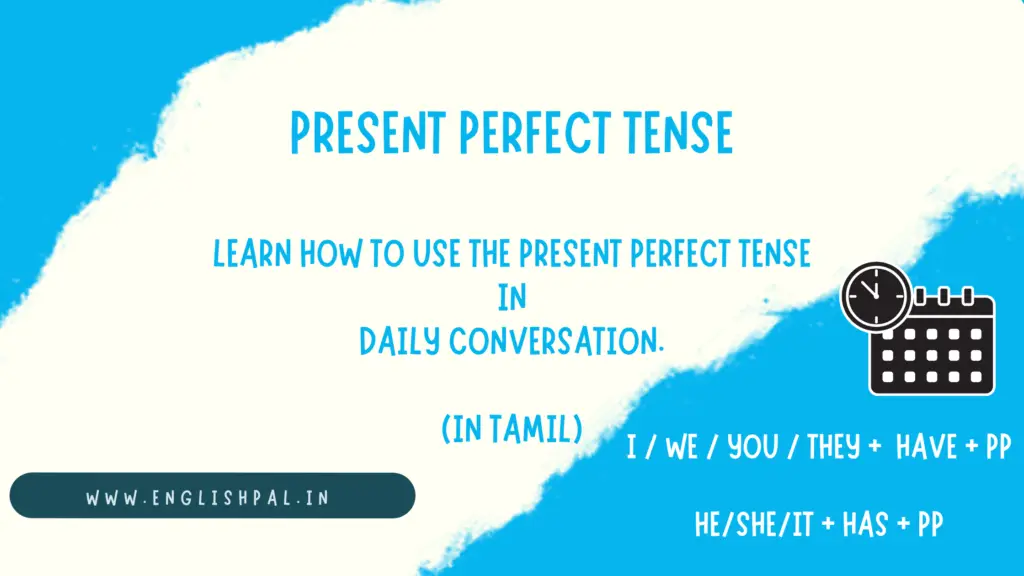
ஒரு செயலானது இறந்த காலத்தில் ஆரம்பித்து அதன் தாக்கம் தற்போதும் இருக்கும் போது அதை குறிப்பிட The Present Perfect Tense உதவுகிறது.
ஒரு செயலானது சமீபத்தில் முடிந்தால் அதை குறிப்பிட.
ஒரு செயலானது ஆரம்பித்து அது இன்னும் முடியாமல் இருக்கும் சூழ்நிலைகளை குறிப்பிட.
ஒரு செயல் நடந்த நேரத்தை பற்றி குறிப்பிடாமல் உள்ள சூழ்நிலைகளை குறிப்பிட The Present Perfect Tense உதவுகிறது.
have மற்றும் has ஆகிய இரண்டு துணை வினைசொற்கள் The Present Perfect Tense அமைக்க உதவுகிறது.
Examples of the present perfect tense in Tamil
1. I have worked as an engineer for two years. (I am still working as an engineer. I started two years ago)
நான் இரண்டு வருடங்களாக பொறியாளராக இருந்துள்ளேன்.(நான் இன்னும் பொறியாளராக வேலை செய்கிறேன், நான் இரண்டு வருடங்களுக்கு முன்னால் ஆரம்பித்தேன்.)
2. He has finished his homework. – அவன் வீட்டுப்பாடத்தை முடித்தார்.
3. She has invited us to her marriage. – அவள் எங்களை அவளின் திருமணத்திற்கு அழைத்தாள்.
Signal words of the present perfect tense
- Just yet – இப்பொழுது தான்.
- Never – ஒருபோதும்.
- Ever – எப்போதும்
- Already – ஏற்கனவே.
- So far – இதுவரை
- Up To Now – இப்போது வரை.
- Since – இருந்து.
- For – ஆக.
- Recently – சமீபத்தில்
The Present Perfect Tense Formula & Examples in Tamil
Subject + Have / Has + Past participle verb
| Subject | Have / Has | Past participle verb |
| I | have | Past participle verb |
| we / You / They | have | Past participle verb |
| He / She / It / Name | has | Past participle verb |
Examples
- I have heard good news about my manager. – எனது மேலாளரைப் பற்றி நல்ல செய்தி கேள்விப்பட்டேன்.
- We have arrived in India. – நாங்கள் இந்தியா வந்துவிட்டோம்.
- You have played the match very well. – நீ போட்டியில் நன்றாக விளையாடினாய்.
- They have gone to the movies. – அவர்கள் திரைப்படத்திற்கு சென்றுள்ளார்கள்.
- He has forgotten his phone’s password. – அவன் தனது தொலைபேசியின் கடவுச்சொல்லை மறந்து விட்டான்.
- She has worked here for 3 years. – அவள் மூண்டு வருடங்களாக வேலை செய்கிறாள்.
- It has rained a lot this month. – இந்த மாதம் அதிக மழை பெய்துள்ளது.
- Haran has finished his job. – கரன் அவனுடைய வேலையை முடித்து உள்ளான்.
The Present Perfect Negative Formula
Subject + Have not / Has not + Past participle verb
| Subject | Have / Has | Past participle verb |
| I | have not | Past participle verb |
| we / You / They | have not | Past participle verb |
| He / She / It / Name | has not | Past participle verb |
Examples of the present perfect negative Form
- I have not heard any good news about my manager. – நான் எனது மேலாளரைப் பற்றி எந்த ஒரு நல்ல செய்தியும் கேள்விப்படவில்லை.
- We have not arrived in India. – நாங்கள் இந்தியாவுக்கு வரவில்லை..
- You have not played the match very well. – நீ போட்டியில் நன்றாக விளையாடவில்லை.
- They have not gone to the movies. – அவர்கள் திரைப்படத்திற்கு செல்லவில்லை.
- He has not forgotten his phone’s password. – அவன் தனது தொலைபேசியின் கடவுச்சொல்லை மறக்கவில்லை.
- She has not worked here for 3 years. – அவள் மூண்டு வருடங்களாக வேலை செய்யவில்லை.
- It has not rained a lot this month. – இந்த மாதம் அதிக மழை பெய்யவில்லை.
- Haran has not finished his job. – கரன் அவனுடைய வேலையை முடிக்கவில்லை.
The Present Perfect Interrogative Formula & Examples in Tamil
Have / Has + Subject + Past participle verb
| Have / Has | Subject | Past participle verb |
| have | I | Past participle verb |
| have | we / You / They | Past participle verb |
| has | He / She / It / Name | Past participle verb |
examples of the present perfect interrogative Form
- Have I heard good news about my manager? – எனது மேலாளரைப் பற்றி நல்ல செய்தியை கேள்விப்பட்டேனா?.
- Have we arrived in India? – நாம் இந்தியா வந்து விட்டோமா?
- Have you played the match very well? – நீ போட்டியை நன்றாக விளயாடினாயா?
- Have they gone to the movies? – அவர்கள் திரைப்படத்திற்கு சென்றார்களா?
- Has he forgotten his phone’s password? – அவன் தன்னுடைய தொலைபேசி கடவுச்சொல்லை மறந்து விட்டானா?
- Has she worked here for 3 years? – அவள் 3 வருடங்களாக இங்கே வேலை செய்தாளா?
- Has it rained a lot this month? – இந்த மாதம் நிறைய மழை பெய்ததா?
- Has Haran finished his job? – கரன் அவனது வேலையை முடிதுவிட்டனா?
சுருக்க வார்த்தைகள்
- I have – I’ve
- We have – We’ve
- You have – You’ve
- They have – They’ve
- He has – He’s
- She has – She’s
- It has – It’s
- Have not – Haven’t
- Has not – Hasn’t
Exercises for the present perfect tense
கீழே கொடுக்கப்பட்டுள்ள வாக்கியங்களைக்கொண்டு வினாவாக்கியம் மற்றும் எதிர்மறை வாக்கியங்களை அமைத்து பயிற்சி எடுக்கவும்.
- I have waited for her.
- We have seen this series before.
- They have made a mess in the hall.
- You have worked very hard.
- He has spent more time on this research.
- She has gone already.
- It has moved from left to right.
- Haran has finished his internship.
- We have seen him today.
- She has broken her hand.
The Present Perfect Continuous Tense in Tamil
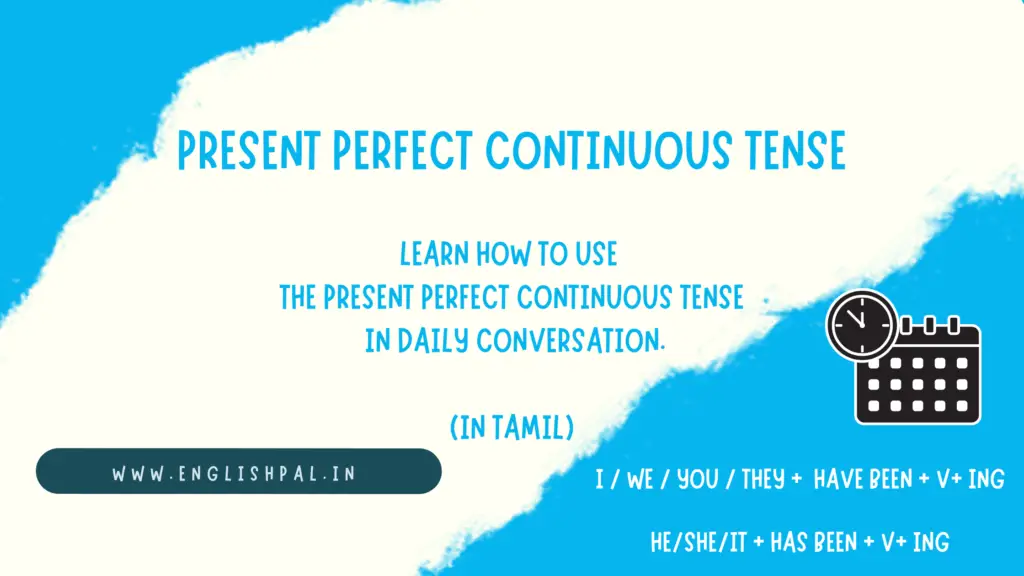
ஒரு செயலானது இறந்த காலத்தில் ஆரம்பித்து, தற்போதும் அது நடந்து கொண்டு இருக்குமாயின் அதனைக் குறிப்பிட நாம் the present perfect continuous tense ஐ உபயோகிக்கலாம். அந்த செயலானது தற்காலிகமானதாகவோ அல்லது முடிவு பெறாததாகவோ இருக்கலாம்.
ஒரு செயலானது இறந்த காலத்தில் ஆரம்பித்து தற்போது முடிந்து இருக்குமாயின் அதனைக் குறிப்பிட The Present Perfect Continuous Tense உதவுகிறது.
Examples of the present perfect continuous tense
1. I have been working as an engineer since 2018. (I started my career in engineering in 2018 and I am still working as an engineer.)
நான் 2018 இல் இருந்து பொறியாளராக பணியாற்றி வருகிறேன். (2018 இல் ஆரம்பித்து இப்பொது வரை பணியாற்றி வருகிறேன்.)
2. He has been waiting for him for 3 hours. – அவன் 3 மணி நேரமாக அவருக்காக காத்துக்கொண்டு இருக்கிறான்.
3. You have been watching TV since 3 a.m. – நீ காலை 3 மணியில் இருந்து தொலைக்காட்சி பார்த்துக்கொண்டு இருக்கிறாய்.
The present perfect continuous tense இல் காணப்படும் வார்த்தைகள்
- For – ஆக
- Since – இருந்து
- How long – எவ்வளவு காலம்
- all day – நாள் முழுவதும்
- The whole day – நாள் முழுவதும்
The Present Perfect Continuous Tense Formula & Examples in Tamil
Subject + have been / has been + verb + ing
| Subject | Have been / Has been | Verb + ing |
| I | have been | Verb + ing |
| we / You / They | have been | Verb + ing |
| He / She / It / Name | has been | Verb + ing |
Examples
- I have been waiting for 6 hours. – நான் 6 மணி நேரமாக காத்திருக்கிறேன்.
- We have been studying for the TNPSC exam for the last 2 years. – கடந்த 2 ஆண்டுகளாக நாங்கள் TNPSC தயாராகிக்கொண்டு இருக்கிறோம்.
- You have been looking for this bag. – நீ இந்த பையை தேடிக்கொண்டிருக்கிறாய்.
- They have been investigating since the morning. – அவர்கள் காலையிலிருந்து விசாரணை நடத்திக்கொண்டு இருக்கிறார்கள்.
- He has been playing cricket since 2021. – அவன் 2021 முதல் கிரிக்கட் விளையாடி வருகிறான்.
- She has been painting for 12 hours. – அவள் 12 மணி நேரமாக அந்த ஓவியத்துக்கு வண்ணம் அடிக்கிறாள்.
- It has been raining all day. – நாள் முழுவதும் மழை பெய்துகொண்டே இருக்கிறது.
- Haran has been waiting for his manager’s order for four hours. – கரன் நான்கு மணி நேரமாக தன மேலாளரின் உத்தரவுக்கு காத்துக்கொண்டு இருக்கிறான்.
The Present Perfect Continuous Negative Formula
Subject + have not been / has not been + verb + ing
| Subject | Have not been / Has not been | Verb + ing |
| I | have not been | Verb + ing |
| we / You / They | have not been | Verb + ing |
| He / She / It / Name | has not been | Verb + ing |
Examples of the Present Perfect Continuous Negative form :
- I have not been waiting for 6 hours. – நான் 6 மணி நேரமாக காத்திருக்கவில்லை.
- We have not been studying for the TNPSC exam for the last 2 years. – கடந்த 2 ஆண்டுகளாக நாங்கள் TNPSC தயாராகவில்லை.
- You have not been looking for this bag. – நீ இந்த பையை தேடவில்லை.
- They have not been investigating since the morning. – அவர்கள் காலையிலிருந்து விசாரணை நடத்தவில்லை.
- He has not been playing cricket since 2021. – அவன் 2021 முதல் கிரிக்கட் விளையாடவில்லை.
- She has not been painting for 12 hours.
- அவள் 12 மணி நேரமாக அந்த ஓவியத்துக்கு வண்ணம் அடிக்கவில்லை.
- It has not been raining all day. – நாள் முழுவதும் மழை பெய்யவில்லை.
- Haran has not been waiting for his manager’s order for four hours. – கரன் நான்கு மணி நேரமாக தன மேலாளரின் உத்தரவுக்கு காத்திருக்கவில்லை.
The Present Perfect Continuous Interrogative Formula
have / has + Subject + been + verb + ing
| Have / Has | Subject | been | Verb + ing |
| have | I | been | Verb + ing |
| have | we / You / They | been | Verb + ing |
| has | He / She / It / Name | been | Verb + ing |
Examples of the present perfect continuous tense
- Have I been waiting for 6 hours? – நான் 6 மணி நேரமாக காத்திருந்தேனா?
- Have we been studying for the TNPSC exam for the last 2 years? – கடந்த 2 ஆண்டுகளாக நாங்கள் TNPSC தயாராகிக்கொண்டு இருக்கிறோமா?
- Have you been looking for this bag? – நீ இந்த பையை தேடிக்கொண்டிருக்கிறாயா?
- Have they been investigating since the morning? – அவர்கள் காலையிலிருந்து விசாரணை நடத்திக்கொண்டு இருக்கிறார்களா?
- Has he been playing cricket since 2021? – அவன் 2021 முதல் கிரிக்கட் விளையாடி வருகிறானா?
- Has she been painting for 12 hours? – அவள் 12 மணி நேரமாக அந்த ஓவியத்துக்கு வண்ணம் அடிக்கிறாளா?
- Has it been raining all day? – நாள் முழுவதும் மழை பெய்துகொண்டே இருக்கிறதா?
- Has Haran been waiting for his manager’s order for four hours? – கரன் நான்கு மணி நேரமாக தன மேலாளரின் உத்தரவுக்கு காத்துக்கொண்டு இருக்கிறானா?
For மற்றும் since எப்போது உபயோகிக்க வேண்டும்?
For
குறிப்பிட்ட கால அளவுகாலை பற்றி நாம் குறிப்பிடும் இடங்களில் for ஐ உபயோகிப்போம். அதாவது ஒரு குறிப்பிட்ட செயல் நடக்க எடுத்துக்கொண்ட நேர இடைவெளியை (இவ்வளவு நேரமாக) குறிக்க for பயன்படுகிறது.
Examples
for 10 hours, for a week, for a month, for 10 years.
Since
ஒரு செயலின் தொடக்க நேரத்தை குறிப்பிட்டு கூறும் இடங்களில் நாம் since ஐ உபயோகிப்போம். அதாவது இந்த நேரத்தில் இந்த செயல் தொடங்கியது என்னும் இடங்களில் உபயோகிக்க வேண்டும்.
Examples
Since 1990, since May 9, since 6 a.m.
Exercises for the present perfect continuous tense
கீழே கொடுக்கப்பட்டுள்ள வாக்கியங்களைக்கொண்டு வினாவாக்கியம் மற்றும் எதிர்மறை வாக்கியங்களை அமைத்து பயிற்சி எடுக்கவும்.
- I have been practicing yoga since 2019.
- We have been attending this function every week.
- You have been working hard to achieve your dream.
- They have been preparing for the exam for months.
- He has been telling lies.
- She has been playing the piano since 3 a.m.
- It has been flying in the air for a few minutes.
- Haran has been saving his money.
Tenses பற்றி அறிய
All 12 Tenses in Tamil with examples
past tense மற்றும் future tense பற்றிஅறிய
Conclusion
இந்த பதிவில் present tense இல் உள்ள 4 வகைகள் பற்றியும் அவற்றின் எதிர்மறை மற்றும் வினா வாக்கியங்களை பற்றியும் மிக தெளிவாக எடுத்துக்காட்டுகளுடன் கண்டோம். இந்த பதிவானது present tense பற்றிய தெளிவான புரிதலை தந்திருக்கும் என நம்புகிறேன். மற்ற இலக்கணப் பிரிவுகளை தெரிந்துகொள்ள நமது மற்ற பதிவுகளை படிக்கவும்.
உங்கள் கருத்துக்களை மற்றும் present tense தொடர்பான சந்தேகங்களை comment இல் பதிவு செய்யவும்.
நன்றி! வாழ்த்துக்களும் அன்புகளும்!

